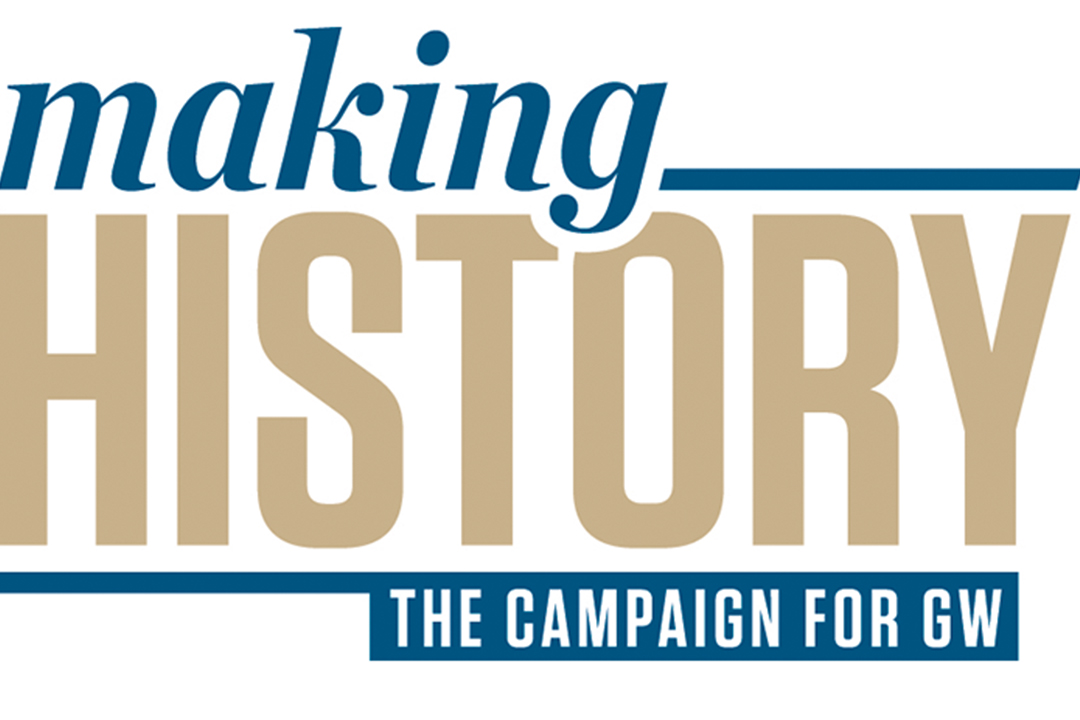“Making History: The Campaign for GW” surpassed its $1 billion fundraising goal a year ahead of schedule, thanks to contributions from nearly 67,000 donors including more than $185 million raised by the Columbian College of Arts and Sciences—the highest total campaign commitments from any of the university’s schools.
Nearly 42,000 alumni donated to their alma mater, with nearly 40,000 donors making their first-ever gifts to GW. During the campaign, 235 new endowments were established, providing perpetual support for student financial aid, professorships, instructional and academic programs, libraries, athletics and more.
“This outflow of support from our alumni and friends is a testament not only to their generosity but to their continued commitment toward making our university home to the highest level of research and learning,” said Columbian College Dean Ben Vinson. “This kind of support is truly game-changing.”
“Making History” realized significant accomplishments around three of its campaign pillars: supporting students, enhancing academics and breaking new ground. During the campaign more than 18,000 donors gave to Power & Promise student aid, providing more than $144 million in funds for undergraduate scholarships and graduate fellowships; more than 20 new endowed faculty positions were created to provide significant resources to recruit, support and retain the best faculty across a variety of disciplines; and over $163 million was donated to build new and upgraded facilities such as Science and Engineering Hall and the GW Museum and The Textile Museum.
Columbian College led the charge, exceeding its own $100 million campaign goal by 185%. (In the past year alone, the college raised $17.9 million in new gifts and commitments and added $4.5 million in new endowments to faculty.) The largest component of the college’s campaign gifts and commitments went to faculty research and new professorships, with $86.6 million raised. The most recent example of that support came from Char Beales, BA ’73, and her husband Howard, who committed $3.2 million to establish the Char Beales Endowed Professorship of Accountability in Journalism. Alumni represented the majority of campaign donors supporting the college, but friends, parents, organizations, faculty and staff also provided a significant amount of support.
The impact of the campaign on creating new research opportunities and educational experiences is being felt throughout Columbian College. The following is a sampling of some of the top gifts received and the ways they are making a difference within the college’s learning community:
- The Wilbur V. (Bill) Harlan Scholarship Trust, established through a $9 million bequest from the estate of the late Wilbur V. (Bill) Harlan, BS ’35, provides undergraduate and graduate students with scholarships and summer stipends to pursue their research interests. A botany major who briefly served as a lab instructor at GW, Harlan became an accomplished agricultural specialist with the U.S. Department of Agriculture, conducting research in Bolivia, Ecuador, Turkey and Honduras. His remarkable philanthropic legacy to Columbian College is supporting new generations of young biologists through scholarships and research stipends, and funding for the cutting-edge greenhouse laboratory, which opened in Science and Engineering Hall this fall.
- A $7 million gift from Gilbert Cisneros, BA ’94, and his wife, Jacki, led to the creation of the GW Cisneros Hispanic Leadership Institute, which helps qualified students attain academic success, build leadership skills and engage in a long-term commitment to making a difference within the Hispanic community. The institute encompasses numerous opportunities to address the challenges Latino youth face in the education arena, including scholarship and mentorship support for select GW students who have aspirations to give back to the Hispanic community. And the institute is home to the Caminos al Futuro pre-college summer program for academically talented rising high school seniors who are involved in leadership and service activities.
- A $2 million grant from Susie and Michael Gelman’s Morningstar Foundation endowed the Max Ticktin Professorship of Israel Studies that is now held by Arie Dubnov, a renowned historian from University of Haifa in Israel. The endowment also supports the training and mentorship of students to foster a broad understanding of the history, politics, society and culture of modern Israel. A towering scholar of modern Israel, beloved teacher, influential leader in the Hillel movement and cherished friend and mentor, the late Rabbi Max Ticktin was an iconic former professor of Hebrew and the cornerstone of the Columbian College’s Judaic Studies Program for more than 30 years.
- A $2.5 million endowed gift from The John L. Loeb Jr. Foundation and the George Washington Institute for Religious Freedom, the Ambassador John L. Loeb Jr. Institute for Religious Freedom at GW fosters dialogue on religious understanding and the separation of church and state. It serves as a center for academic collaboration in religion, peace studies, history, political science and other programs for scholars, students, educators and the public. A businessman, philanthropist and art collector, John L. Loeb Jr. served as the U.S. ambassador to Denmark from 1981 to 1983 and as a delegate to the United Nations. “I can't think of a more appropriate institution to carry on the work of the George Washington Institute for Religious Freedom than this university, named for our first president," Amb. Loeb said.
- A $500,000 gift from Bruce and Cindy Terker to establish the Terker Distinguished Fellows in Media and Public Affairs provides aspiring communications professionals the invaluable opportunity to learn from leaders in the field. The fellows program brings to campus notable figures from media, political communication and public affairs—including national political correspondents, White House press secretaries and U.S. senators—to engage students through class discussions, public events and career advising. For the Terkers, creating the fellows program was their way of giving back for the “incredible” student experience of their daughter Jennifer Terker, BA ’13.


